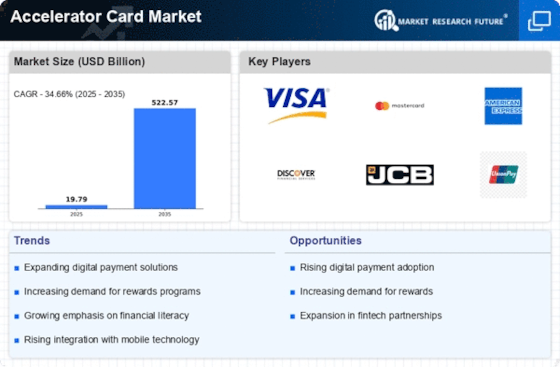Central Processing Units (CPU)
Graphics Processing Units (GPU)
Field-Programmable Gate Arrays (FPGA)
Application-specific Integrated Circuit (ASIAC)
High-performance Computing Accelerator
Cloud Accelerator
Video And Image Processing
Machine Learning
Data Analytics
Mobile Phones
Others
Accelerator Card Market by Processor TypeCentral Processing Units (CPU)
Graphics Processing Units (GPU)
Field-Programmable Gate Arrays (FPGA)
Application-specific Integrated Circuit (ASIAC)
Accelerator Card Market by Accelerator TypeHigh-performance Computing Accelerator
Cloud Accelerator
Accelerator Card Market by ApplicationVideo And Image Processing
Machine Learning
Data Analytics
Mobile Phones
Others
Accelerator Card Market by Processor TypeCentral Processing Units (CPU)
Graphics Processing Units (GPU)
Field-Programmable Gate Arrays (FPGA)
Application-specific Integrated Circuit (ASIAC)
Accelerator Card Market by Accelerator TypeHigh-performance Computing Accelerator
Cloud Accelerator
Accelerator Card Market by ApplicationVideo And Image Processing
Machine Learning
Data Analytics
Mobile Phones
Others
Accelerator Card Market by Processor TypeCentral Processing Units (CPU)
Graphics Processing Units (GPU)
Field-Programmable Gate Arrays (FPGA)
Application-specific Integrated Circuit (ASIAC)
Accelerator Card Market by Accelerator TypeHigh-performance Computing Accelerator
Cloud Accelerator
Accelerator Card Market by ApplicationVideo And Image Processing
Machine Learning
Data Analytics
Mobile Phones
Others
Accelerator Card Market by Processor TypeCentral Processing Units (CPU)
Graphics Processing Units (GPU)
Field-Programmable Gate Arrays (FPGA)
Application-specific Integrated Circuit (ASIAC)
Accelerator Card Market by Accelerator TypeHigh-performance Computing Accelerator
Cloud Accelerator
Accelerator Card Market by ApplicationVideo And Image Processing
Machine Learning
Data Analytics
Mobile Phones
Others
Germany Outlook (USD Billion, 2018-2032)
Accelerator Card Market by Processor TypeCentral Processing Units (CPU)
Graphics Processing Units (GPU)
Field-Programmable Gate Arrays (FPGA)
Application-specific Integrated Circuit (ASIAC)
Accelerator Card Market by Accelerator TypeHigh-performance Computing Accelerator
Cloud Accelerator
Accelerator Card Market by ApplicationVideo And Image Processing
Machine Learning
Data Analytics
Mobile Phones
Others
Accelerator Card Market by Processor TypeCentral Processing Units (CPU)
Graphics Processing Units (GPU)
Field-Programmable Gate Arrays (FPGA)
Application-specific Integrated Circuit (ASIAC)
Accelerator Card Market by Accelerator TypeHigh-performance Computing Accelerator
Cloud Accelerator
Accelerator Card Market by ApplicationVideo And Image Processing
Machine Learning
Data Analytics
Mobile Phones
Others
Accelerator Card Market by Processor TypeCentral Processing Units (CPU)
Graphics Processing Units (GPU)
Field-Programmable Gate Arrays (FPGA)
Application-specific Integrated Circuit (ASIAC)
Accelerator Card Market by Accelerator TypeHigh-performance Computing Accelerator
Cloud Accelerator
Accelerator Card Market by ApplicationVideo And Image Processing
Machine Learning
Data Analytics
Mobile Phones
Others
Accelerator Card Market by Processor TypeCentral Processing Units (CPU)
Graphics Processing Units (GPU)
Field-Programmable Gate Arrays (FPGA)
Application-specific Integrated Circuit (ASIAC)
Accelerator Card Market by Accelerator TypeHigh-performance Computing Accelerator
Cloud Accelerator
Accelerator Card Market by ApplicationVideo And Image Processing
Machine Learning
Data Analytics
Mobile Phones
Others
Accelerator Card Market by Processor TypeCentral Processing Units (CPU)
Graphics Processing Units (GPU)
Field-Programmable Gate Arrays (FPGA)
Application-specific Integrated Circuit (ASIAC)
Accelerator Card Market by Accelerator TypeHigh-performance Computing Accelerator
Cloud Accelerator
Accelerator Card Market by ApplicationVideo And Image Processing
Machine Learning
Data Analytics
Mobile Phones
Others
Accelerator Card Market by Processor TypeCentral Processing Units (CPU)
Graphics Processing Units (GPU)
Field-Programmable Gate Arrays (FPGA)
Application-specific Integrated Circuit (ASIAC)
Accelerator Card Market by Accelerator TypeHigh-performance Computing Accelerator
Cloud Accelerator
Accelerator Card Market by ApplicationVideo And Image Processing
Machine Learning
Data Analytics
Mobile Phones
Others
Accelerator Card Market by Processor TypeCentral Processing Units (CPU)
Graphics Processing Units (GPU)
Field-Programmable Gate Arrays (FPGA)
Application-specific Integrated Circuit (ASIAC)
Accelerator Card Market by Accelerator TypeHigh-performance Computing Accelerator
Cloud Accelerator
Accelerator Card Market by ApplicationVideo And Image Processing
Machine Learning
Data Analytics
Mobile Phones
Others
Accelerator Card Market by Processor TypeCentral Processing Units (CPU)
Graphics Processing Units (GPU)
Field-Programmable Gate Arrays (FPGA)
Application-specific Integrated Circuit (ASIAC)
Accelerator Card Market by Accelerator TypeHigh-performance Computing Accelerator
Cloud Accelerator
Accelerator Card Market by ApplicationVideo And Image Processing
Machine Learning
Data Analytics
Mobile Phones
Others
Accelerator Card Market by Processor TypeCentral Processing Units (CPU)
Graphics Processing Units (GPU)
Field-Programmable Gate Arrays (FPGA)
Application-specific Integrated Circuit (ASIAC)
Accelerator Card Market by Accelerator TypeHigh-performance Computing Accelerator
Cloud Accelerator
Accelerator Card Market by ApplicationVideo And Image Processing
Machine Learning
Data Analytics
Mobile Phones
Others
Accelerator Card Market by Processor TypeCentral Processing Units (CPU)
Graphics Processing Units (GPU)
Field-Programmable Gate Arrays (FPGA)
Application-specific Integrated Circuit (ASIAC)
Accelerator Card Market by Accelerator TypeHigh-performance Computing Accelerator
Cloud Accelerator
Accelerator Card Market by ApplicationVideo And Image Processing
Machine Learning
Data Analytics
Mobile Phones
Others
Accelerator Card Market by Processor TypeCentral Processing Units (CPU)
Graphics Processing Units (GPU)
Field-Programmable Gate Arrays (FPGA)
Application-specific Integrated Circuit (ASIAC)
Accelerator Card Market by Accelerator TypeHigh-performance Computing Accelerator
Cloud Accelerator
Accelerator Card Market by ApplicationVideo And Image Processing
Machine Learning
Data Analytics
Mobile Phones
Others
Accelerator Card Market by Processor TypeCentral Processing Units (CPU)
Graphics Processing Units (GPU)
Field-Programmable Gate Arrays (FPGA)
Application-specific Integrated Circuit (ASIAC)
Accelerator Card Market by Accelerator TypeHigh-performance Computing Accelerator
Cloud Accelerator
Accelerator Card Market by ApplicationVideo And Image Processing
Machine Learning
Data Analytics
Mobile Phones
Others
Accelerator Card Market by Processor TypeCentral Processing Units (CPU)
Graphics Processing Units (GPU)
Field-Programmable Gate Arrays (FPGA)
Application-specific Integrated Circuit (ASIAC)
Accelerator Card Market by Accelerator TypeHigh-performance Computing Accelerator
Cloud Accelerator
Accelerator Card Market by ApplicationVideo And Image Processing
Machine Learning
Data Analytics
Mobile Phones
Others
Accelerator Card Market by Processor TypeCentral Processing Units (CPU)
Graphics Processing Units (GPU)
Field-Programmable Gate Arrays (FPGA)
Application-specific Integrated Circuit (ASIAC)
Accelerator Card Market by Accelerator TypeHigh-performance Computing Accelerator
Cloud Accelerator
Accelerator Card Market by ApplicationVideo And Image Processing
Machine Learning
Data Analytics
Mobile Phones
Others
Accelerator Card Market by Processor TypeCentral Processing Units (CPU)
Graphics Processing Units (GPU)
Field-Programmable Gate Arrays (FPGA)
Application-specific Integrated Circuit (ASIAC)
Accelerator Card Market by Accelerator TypeHigh-performance Computing Accelerator
Cloud Accelerator
Accelerator Card Market by ApplicationVideo And Image Processing
Machine Learning
Data Analytics
Mobile Phones
Others
Accelerator Card Market by Processor TypeCentral Processing Units (CPU)
Graphics Processing Units (GPU)
Field-Programmable Gate Arrays (FPGA)
Application-specific Integrated Circuit (ASIAC)
Accelerator Card Market by Accelerator TypeHigh-performance Computing Accelerator
Cloud Accelerator
Accelerator Card Market by ApplicationVideo And Image Processing
Machine Learning
Data Analytics
Mobile Phones
Others

















Leave a Comment